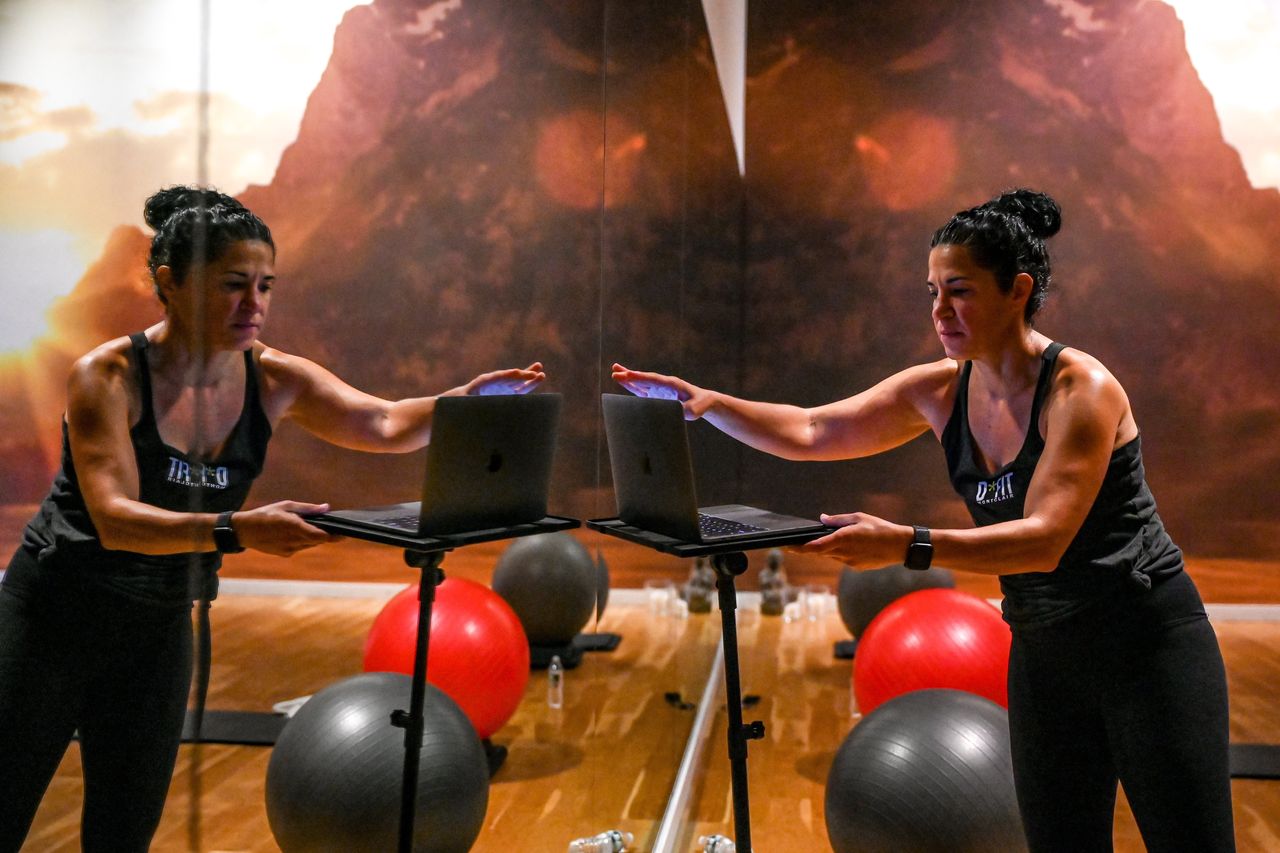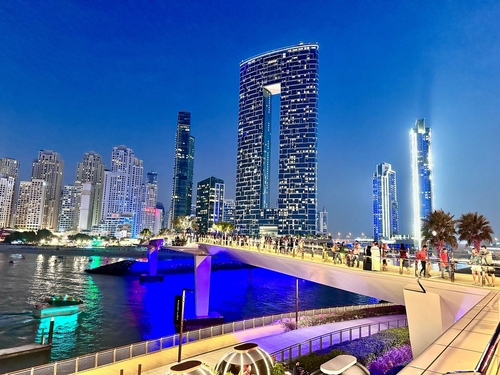The Future of the Gym Is Hybrid (Just Like the Office)
Fitness studios are combining virtual and in-person classes.
Every morning, Daniela Costanzo wakes up at 5, drinks a cup of coffee, feeds her two dogs, then heads to DFit, the Montclair, N.J.-based workout studio she’s owned for the past decade.
Last Wednesday was no different, except for one relatively new pre-class ritual Ms. Costanzo added to her routine during the pandemic. Before the early risers arrived for her first class, she powered on her laptop and started a Zoom meeting.
Two virtual clients popped on-screen, while eight students made their way into the studio. At 7:15 a.m., the crew started its full-body workout all together: a series of heart-pumping shoulder presses, squats, rows, lunges and core work.
In the Before Times, gyms and studios such as DFit were destinations—spaces with nice equipment, freshly laundered towels and, critically, no distractions from partners, kids or pets. Meanwhile, people who couldn’t get out used apps and connected platforms, such as Peloton, designed for home use. The pandemic forced the former to take a page from the latter, and many studios and gyms decided to continue providing home workouts, even after Covid restrictions lifted.
“I’m committed to it 100%,” Ms. Costanzo said. One reason, she says, is that going virtual is cost-effective. A Zoom business license costs about $20 a month. DFit currently offers six virtual classes a week, alongside indoor and outdoor workouts.
For now, the virtual classes are more of a necessity as the threat of the Delta variant looms large. While the studio is seeing more new clients looking to lose their pandemic pounds, attendance still isn’t at pre-Covid levels. Teaching over Zoom is also a drain on instructors, who typically draw energy from loud music and packed classes. Tracks have to be quiet, so students can hear the instructors.
“It feels like I taught four classes when it was just one. That’s how much energy it takes,” Ms. Costanzo said.
At the start of the pandemic, DFit instructors streamed live workouts free on Instagram. Some garnered over 100 participants—much more than a typical studio class. “For such a bad, uncertain time, the energy we felt through Instagram was phenomenal,” Ms. Costanzo said.
A week later, the studio began hosting Zoom classes for paying customers.
Clients can reserve classes through DFit’s online portal, which is operated by booking software Mindbody. About 12 hours before the class, a DFit employee manually emails each participant a Zoom link. Clients are charged normal prices—up to $25 a pop or unlimited access for up to $255 a month.
Ms. Costanzo’s regulars love the flexibility. “Right now, we’re in the heat of vacation season. But I have people joining us from Hawaii and from Germany.” One longtime client moved out of state to Philadelphia. “We’re thrilled we still have her as a client,” Ms. Costanzo said.
A Mindbody survey from February found that 65% of respondents intended to complete workouts both in person and at home in a post-Covid world. And in a survey from July, 86% of respondents who do virtual workouts said they continued to do them as much or more, even as studios are reopening.
Sunil Rajasekar, president of Mindbody, said that convenience is the push behind this consumer shift. “The experience is not the same as an in-person class, but it is way better than not taking the class at all,” he said. “It is also a great way for wellness businesses to expand their reach.”
During the height of the pandemic, Peloton and other at-home workout solutions soared, while gym operators struggled to survive. The International Health, Racquet & Sportsclub Association estimates one in four gyms permanently closed in 2020. Nationwide fitness chains Flywheel and YogaWorks permanently closed all studios that year.
“The chaos of the pandemic forced us to innovate,” said Joey Gonzalez, chief executive of Barry’s Bootcamp, which has 70 locations around the world, offering combination strength-and-cardio workouts.
Before 2020, Mr. Gonzalez wasn’t considering digital fitness for the company. The studios tout perks that can’t be offered in an app: workout rooms drenched in a nightclubby red glow, high-end treadmills with shock-absorbing belts, salon-grade products in its locker rooms and a recovery smoothie bar.
But Barry’s did eventually transition to Zoom workouts during the pandemic, featuring instructors streaming from their living rooms, dealing with audio and Wi-Fi issues like the rest of us.
“One of the most surprising things for us was people were coming to us from places where Barry’s doesn’t exist, like Dublin and Hong Kong,” Mr. Gonzalez said.
To reduce its dependence on Zoom, the company recruited an external agency to create its own Barry’s-ified live video-enabled workout experience, with trainers in a dedicated studio. Earlier this month, it launched Barry’s X, which streams via an app, website or the Forme smart mirror. Live streams cost between $12 and $20 a piece, or can be accessed through a monthly membership, which also includes a library of prerecorded workouts.
There’s some indication that the at-home boom is starting to bust. Peloton recently lowered the price of its original bike by 20%, in anticipation of slowing growth. And at the end of July, Barry’s studios were at 86% of pre-Covid attendance. But Mr. Gonzalez acknowledges that the Delta variant is hampering a full in-person comeback.
Equinox, the luxury gym chain, launched an on-demand fitness mobile app in March 2020, right as the global quarantine began. The app, called Equinox+, includes workouts from SoulCycle, Solidcore and other Equinox subbrands. A subscription costs $40 a month, but for Equinox members, who often pay upward of $200 a month, access to the app is included as a perk.
According to the company, those who visit a club and use the Equinox+ app are the most active members, working out one or two more times a week than those using the club or app alone. What’s funny is that some people even use the Equinox+ app inside Equinox clubs.
So it seems our desk-sharing, partially work-from-home future won’t be the only hybrid model in our lives. Some might refer to the new exercise paradigm as the hybrid gym. Others might say it’s “gym as a service.” I’m just hoping no one will call it “GaaS.”
Reprinted by permission of WSJ. Magazine. Copyright 2021 Dow Jones & Company. Inc. All Rights Reserved Worldwide. Original date of publication: August 29, 2021.
 Copyright 2020, Dow Jones & Company, Inc. All Rights Reserved Worldwide. LEARN MORE
Copyright 2020, Dow Jones & Company, Inc. All Rights Reserved Worldwide. LEARN MORE
This stylish family home combines a classic palette and finishes with a flexible floorplan
Just 55 minutes from Sydney, make this your creative getaway located in the majestic Hawkesbury region.
As Paris makes its final preparations for the Olympic games, its residents are busy with their own—packing their suitcases, confirming their reservations, and getting out of town.
Worried about the hordes of crowds and overall chaos the Olympics could bring, Parisians are fleeing the city in droves and inundating resort cities around the country. Hotels and holiday rentals in some of France’s most popular vacation destinations—from the French Riviera in the south to the beaches of Normandy in the north—say they are expecting massive crowds this year in advance of the Olympics. The games will run from July 26-Aug. 1.
“It’s already a major holiday season for us, and beyond that, we have the Olympics,” says Stéphane Personeni, general manager of the Lily of the Valley hotel in Saint Tropez. “People began booking early this year.”
Personeni’s hotel typically has no issues filling its rooms each summer—by May of each year, the luxury hotel typically finds itself completely booked out for the months of July and August. But this year, the 53-room hotel began filling up for summer reservations in February.
“We told our regular guests that everything—hotels, apartments, villas—are going to be hard to find this summer,” Personeni says. His neighbours around Saint Tropez say they’re similarly booked up.
As of March, the online marketplace Gens de Confiance (“Trusted People”), saw a 50% increase in reservations from Parisians seeking vacation rentals outside the capital during the Olympics.
Already, August is a popular vacation time for the French. With a minimum of five weeks of vacation mandated by law, many decide to take the entire month off, renting out villas in beachside destinations for longer periods.
But beyond the typical August travel, the Olympics are having a real impact, says Bertille Marchal, a spokesperson for Gens de Confiance.
“We’ve seen nearly three times more reservations for the dates of the Olympics than the following two weeks,” Marchal says. “The increase is definitely linked to the Olympic Games.”

Getty Images
According to the site, the most sought-out vacation destinations are Morbihan and Loire-Atlantique, a seaside region in the northwest; le Var, a coastal area within the southeast of France along the Côte d’Azur; and the island of Corsica in the Mediterranean.
Meanwhile, the Olympics haven’t necessarily been a boon to foreign tourism in the country. Many tourists who might have otherwise come to France are avoiding it this year in favour of other European capitals. In Paris, demand for stays at high-end hotels has collapsed, with bookings down 50% in July compared to last year, according to UMIH Prestige, which represents hotels charging at least €800 ($865) a night for rooms.
Earlier this year, high-end restaurants and concierges said the Olympics might even be an opportunity to score a hard-get-seat at the city’s fine dining.
In the Occitanie region in southwest France, the overall number of reservations this summer hasn’t changed much from last year, says Vincent Gare, president of the regional tourism committee there.
“But looking further at the numbers, we do see an increase in the clientele coming from the Paris region,” Gare told Le Figaro, noting that the increase in reservations has fallen directly on the dates of the Olympic games.
Michel Barré, a retiree living in Paris’s Le Marais neighbourhood, is one of those opting for the beach rather than the opening ceremony. In January, he booked a stay in Normandy for two weeks.
“Even though it’s a major European capital, Paris is still a small city—it’s a massive effort to host all of these events,” Barré says. “The Olympics are going to be a mess.”
More than anything, he just wants some calm after an event-filled summer in Paris, which just before the Olympics experienced the drama of a snap election called by Macron.
“It’s been a hectic summer here,” he says.

AFP via Getty Images
Parisians—Barré included—feel that the city, by over-catering to its tourists, is driving out many residents.
Parts of the Seine—usually one of the most popular summertime hangout spots —have been closed off for weeks as the city installs bleachers and Olympics signage. In certain neighbourhoods, residents will need to scan a QR code with police to access their own apartments. And from the Olympics to Sept. 8, Paris is nearly doubling the price of transit tickets from €2.15 to €4 per ride.
The city’s clear willingness to capitalise on its tourists has motivated some residents to do the same. In March, the number of active Airbnb listings in Paris reached an all-time high as hosts rushed to list their apartments. Listings grew 40% from the same time last year, according to the company.
With their regular clients taking off, Parisian restaurants and merchants are complaining that business is down.
“Are there any Parisians left in Paris?” Alaine Fontaine, president of the restaurant industry association, told the radio station Franceinfo on Sunday. “For the last three weeks, there haven’t been any here.”
Still, for all the talk of those leaving, there are plenty who have decided to stick around.
Jay Swanson, an American expat and YouTuber, can’t imagine leaving during the Olympics—he secured his tickets to see ping pong and volleyball last year. He’s also less concerned about the crowds and road closures than others, having just put together a series of videos explaining how to navigate Paris during the games.
“It’s been 100 years since the Games came to Paris; when else will we get a chance to host the world like this?” Swanson says. “So many Parisians are leaving and tourism is down, so not only will it be quiet but the only people left will be here for a party.”
This stylish family home combines a classic palette and finishes with a flexible floorplan
Just 55 minutes from Sydney, make this your creative getaway located in the majestic Hawkesbury region.






















